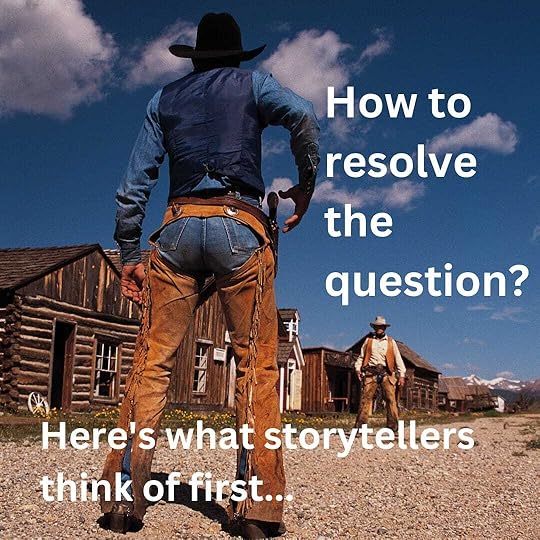Gerald Everett Jones's Blog: Gerald Everett Jones - Author, page 32
May 14, 2023
Does Hollywood promote gun violence?
When a Hollywood studio exec tells the writer to “raise the stakes,” it almost always means “threaten to kill someone.”

When I was writing Bonfire of the Vanderbilts, I fretted about how to resolve the plot. Admittedly, it’s a “woman-jeopardy” story, and one form of abuse she gets is gaslighting by a malevolent spouse.
The novel has a parallel plot about a century-old art scandal involving the family of Cornelius Vanderbilt II during the late nineteenth century. Only after I’d written the book did I learn that art theft and art forgery have become a popular genre in historical fiction.
At the same time, I was imagining how the complex, interwoven plots would play as a streaming TV series. So to resolve my puzzlement, I resorted to a technique that author Michel Houellebecq used in his novel The Map and the Territory - I inserted myself into the drama as a principal character.
Here follows the chapter from Bonfire the Vanderbilts in which a fictional character with my name takes a meeting at Spectacular Artists Agency about what must be done to his story before his reps will consider selling the movie rights.
 Chapter 31: At Spectacular Artists
Chapter 31: At Spectacular ArtistsMonday, April 13, 2015, Century City
Gerald Everett Jones drove his 2005 Chevy Malibu north on Avenue of the Stars and pulled into the driveway of the long, glistening building that housed Spectacular Artists. Although he’d passed the place any number of times, he’d never been inside. He’d had some dealings with them at the old location on Wilshire Boulevard, which was itself an impressive designer structure. This new one appeared to be constructed entirely of tinted glass and seemed more appropriate to some secret government agency where people puzzled over computer displays behind cypher-locked doors.
May 12, 2023
James Bond's E. Jean Carroll Moment
Times have changed. The Hugh Hefner era coincided with the introduction of the birth control pill, the feminist revolution, and the notion that sex for reasons other than that procreation might not be sinful, even recreational and normal.
Certainly, none of this would have been news to earlier generations, but sexual promiscuity until about the 1960s had been like alcohol under Prohibition - something most people wanted to do - and many did - but as a social norm was considered shameful.
It’s amazing to me now that James Bond was ever openly admired. But because I lived through that era - I know that such aggressiveness was considered by many to be a role model for macho behavior.
This clip doesn’t show what Bond did to the nurse in the steam room, which viewers were made to assume she enjoyed because of his irresistible endowment and prowess. Viewing this clip in the light of today’s sensibilities, I’d say her actions here weren’t meant as an invitation. So, even within the context of movie fiction, the filmmakers must have assumed that showing she said no would simply encourage him.
The further implication is that she didn’t really mean it. That’s where it goes all wrong.
May 10, 2023
Reading from 'Preacher Fakes a Miracle'
The gentrification of Missouri farmland has brought not only casino culture but also investors and influencers from all over the world. Evan Wycliff, a lapsed Baptist minister and unconfessed agnostic, often gets dragged into dealing with problems others have given up solving. There's an orphanage that serves young women, and some get placed in part-time work at the lakeside resorts.
They're supposed to be working in the laundry. But some have been pushed upstairs.
Thinking About Thinking is a reader-supported publication. To receive new posts and support my work, consider becoming a free or paid subscriber.
And then the prettiest one goes missing...
Thinking About Thinking is a reader-supported publication. To receive new posts and support my work, consider becoming a free or paid subscriber.
The Last Days of Ptolemy Grey: What if you found new romance at the end of your life?

Well, I suppose if you believe in reincarnation the affair might be a preview of your next episode. But if that’s all there is, at least you had that delicious sip.
Walter Mosley is best known for his prolific detective fiction. But this book is a fond, thoughtful story about a man who finds reasons to live just when he doesn't have much time left.
Here's my book review of The Last Days of Ptolemy Grey. It isn't a whodunit. It's artful, introspective literary fiction about a 91-year-old man near the end of his life. (It’s also now a limited TV series on Apple+. I’m commenting on the book here. The movie adaptation does have some significant differences, but that’s not my focus here.)
May 8, 2023
'Thinking About Thinking' is moving to Substack
You may have noticed in recent emails that my blog and newsletter at geraldeverettjones.com is moving to Substack (geraldeverettjones.substack.com). Some posts will be free others behind a paywall, as will GetPublishedRadio! podcasts.
My booklist, bio, and the archive of previous blog posts will remain online at geraldeverettjones.com. A free link to the podcast episode archive is on the landing page at getpublishedradio.com, and if you’ve subscribed to the show via a distribution service such as iTunes or Spotify, those apps will still carry the episodes.
This move is in search of a wider audience, and early results have been encouraging. I appreciate your interest and support. Storytelling builds community - and can bring our communities together.
Gerald
May 7, 2023
The Marriage Plot: Does the old story still work?
Her choices for the future will be to enter a convent or resign herself to spinsterhood.

First suit, first girlfriend. Independence, Missouri circa 1953. (Thinking about thinking even then.)
Surely a well-matched marriage isn't every woman's goal these days. But is the old literary genre worn out? What about the appeal of all those romance novels? Is all love transactional? Is romantic love a "useful fiction?"
Thinking About Thinking is a reader-supported publication. To receive new posts and support my work, consider becoming a free or paid subscriber.
My book review and reading suggestion for this installment is The Marriage Plot by Jeffrey Eugenides. It's a contemporary story about four friends, which begins when they meet in college at Brown. It updates the question embedded in the old theme.
It's about whether we understand anything about what makes relationships work.

The Marriage Plot is masterful on many levels. At first I wasn't drawn to any of the three characters in the love triangle – Madeleine, Leonard, and Mitchell. Each seemed deeply flawed, and they are. Except you read along and find that Eugenides thinks we all are, just as deeply in our unique ways, and are none the lesser for it. That's the way people are, and the way life goes. We stumble through it, thinking we are somehow in control, and it's what happens nevertheless while we are furiously busy making other plans, or simply fretting about making up our minds.
This is a literary novel, in the best sense, and I was surprised to read some critics cramming it into the diminutive genre "campus novel." That would be like classifying Pride and Prejudice as a rom com, which is not as irrelevant as it sounds. The marriage plot, you see, is the genre form of which that work is representative. Eugenides wants to know whether the marriage plot is dead as a meaningful literary form, now that marriage seems hardly worthy as the ultimate goal of youthful aspirations.
But back to Eugenides. The characters meet in a semiotics class at Brown, and the author gives a lot of detail about the subject and its impact on their personal thoughts. Semiotics claims, for example, that humans would not experience love as we have come to understand it unless we had read about it (or seen movies about it) first. There's a similar concept in Stendhal's The Red and the Black. The narrator comments that peasants in the French countryside cope with life less well than the sophisticated citizens of Paris, who have all read novels that give them models for how to act in society.
Ultimately, this is a novel about perception, what we make of reality as it is happening to us, and our inability to make meaning of events in time to control their outcome. Things happen or they don't. Things work out or they don't. They mostly don't, and we move on.
Perhaps significantly, the character in this book who understands himself best is the one whose grasp on reality is most tenuous because he has to work at staying sane. In his acknowledgments, Eugenides credits several experts and sources for genetic research (another theme), but he thanks no one for his extensive detailing of bipolar disorder and its treatment. So naturally I wonder how he came by this information, and at what personal cost.

In my recent novel Harry Harambee's Kenyan Sundowner, I pose the question of whether love is transactional. Think about it - even with unconditional love, the giver may be just as gratified as the receiver. The givers' gift to themselves may be to free them from worry about what the loved one might do next - to them or to anyone else. And - to take the other extreme - behavioral psychologists will tell you that bad or dysfunctional behavior won't be repeated unless the psyche perceives some benefit, however wrong-headed.
 Thinking About Thinking AB810 The Author Reads Harry HarambeeListen now (4 min) | Our show host Gerald Everett Jones reads from his multiple-award-winning novel Harry Harambee's Kenyan Sundowner. Intrigue on the white sands of the Indian Ocean. Is corruption a fact of life? Is all love transactional? #booklovers #bookstagrammers #litfic… Listen nowa year ago · Gerald Everett Jones
Thinking About Thinking AB810 The Author Reads Harry HarambeeListen now (4 min) | Our show host Gerald Everett Jones reads from his multiple-award-winning novel Harry Harambee's Kenyan Sundowner. Intrigue on the white sands of the Indian Ocean. Is corruption a fact of life? Is all love transactional? #booklovers #bookstagrammers #litfic… Listen nowa year ago · Gerald Everett JonesWell, what do you think?
Thinking About Thinking is a reader-supported publication. To receive new posts and support my work, consider becoming a free or paid subscriber.
May 6, 2023
Write like it's career suicide.

When I used to write mostly nonfiction - business and technical books - I was supervised by someone on the publisher’s editorial staff. I had to submit an outline, which was then approved. I wrote to a schedule, often one or two chapters a week. And if I planned to depart from the outline, I had to seek permission from the editor and explain why.
I’m sure there are fiction writers who approach their work the same way. But I’ve discovered - especially when writing mysteries - that making it up as I go along can generate surprising results. And if I can surprise myself, perhaps I can delight the reader.
This approach requires letting my subconscious mind lead the way. That’s why it feels risky and often scary.
This is Thinking About Thinking.
May 3, 2023
I Blame Hemingway for AI Bot Behavior

Ernest Hemingway boxed set of his most popular titles (Scribners)
There’s been a lot of recent speculation and fretting among authors and editors about the impacts of AI. Many of us have been using writing-aid tools that weren’t labeled as such, and perhaps we never noticed those algorithms getting progressively smarter. Now the debate is out in the open, along with a flurry of new product introductions and enhancements aimed directly at writers.
I’ll make this prediction, which is likely to be a reassurance for journalists and an annoyance or worse for fiction writers: AI bots do and will continue to encourage and train writers to write like Hemingway – that is, in clear, simple prose. Hemingway was a journalist who turned to fiction. His contribution to expository writing can’t be understated. Many journalists at the turn of the century delighted in their flowery prose, as did novelists such as Edith Wharton and her friend and colleague Henry James. Hemingway’s advice to keep it straightforward and simple has been a blessing to clear expression ever since. But because he carried that spare style into his novels, several generations of authors dumbed down their artistic expression.
I believe no one ever accused Hemingway’s reportorial style of sounding like poetry when read aloud.
Even before AI editorial tools such as Grammarly and ProWritingAid, Microsoft Word would report on your document’s reading-level scores. In the recent past, the general rule was that expository writing for adults should be aimed at the tenth-grade reading level. This was true for The New York Times and for textbooks, not only at the high-school but also university level. Notoriously and deliberately, USA Today aimed at the seventh grade.
You don’t need a bot for the basic formula to write like Hemingway for readers who expect plain prose:
Avoid sentences with more than two independent clauses.Use words with no more than three syllables.Use active voice.Make the takeaway statement from a paragraph the first, or topic, sentence – not the last one.Some book editors will add another all-encompassing rule for fiction: Show, don’t tell. This is useful advice for novelists and their agents who want screenwriters to adapt their books to the screen. I would direct those critics to Paul Auster’s 4 3 2 1, a novel which is all telling in paragraphs that sometimes exceed a page in length. Bad writing? Apparently the judges of the Booker Prize didn’t think so. Auster’s admittedly daring experiment made the prize short list, and in 2017 several newspapers named it best book of the year.
All of the editorial bots will try to force your writing into Hemingway’s mold. And if you’re writing a business report or a news article or an instruction manual, your readers will benefit, and your arguments will be less obscure.
Even when you’re writing fiction, book agents and editorial staff at publishing houses may encourage you to do the same. Perhaps agents think the interns who read manuscripts on the first round read at the fifth-grade level. And it may well be that the publishing houses think the audience for a genre work will be broader if posted reviews don’t complain the book is “hard to read.”
Consider, though, the example of authors whom other authors admire. For example, I’m reading Less by Andrew Sean Greer. This Pulitzer-prize-winning novel is written in a style that’s distinctly Greer’s, and he’s bringing armloads and carloads of flowery stuff. I shudder to imagine the result if he’d passed his manuscript through Grammarly and simply hit “Accept All.”

Preacher Evan Wycliff is a reluctant investigator because people come to him with problems no one else cares to solve, and he has an obsessively curious mind about why bad things happen to good people.
The post I Blame Hemingway for AI Bot Behavior appeared first on Gerald Everett Jones - Author.
April 23, 2023
Readers and Close Observers, Great Actors as Bad Actors
Here’s a spirited interview with author and show host Karina Kantas, who resides in Greece and writes some chilling stuff. We talked about Preacher Raises the Dead and Near-Death Experience, but we couldn’t help ourselves and the discussion included topics such as WWI in the Middle East, modern Kenyan culture and politics, strife in Ukraine, aftermath of Covid, controversial literary topics yesterday and today, writing from the subconscious, fiction as escapism and involvement… In short, What’s behind the pen?
#latimesfestivalofbooks @latimesfob
The post Readers and Close Observers, Great Actors as Bad Actors appeared first on Gerald Everett Jones - Author.
March 31, 2023
Book Review: Lessons in Chemistry – A Satire on Sexual Politics
The book categories Amazon has assigned to the bestselling novel Lessons in Chemistry are “Mothers & Children Fiction,” “Humorous Fiction,” and “Literary Fiction.” All are apt, up to a point. It’s about an unwed mother who is raising an only female child. The plot is suffused with humor and oddball antics. And, yes, the prose in this first novel from Bonnie Garmus is masterful.

Lessons in Chemistry. A frivolous entertainment it’s not.
But the most fitting category, I think, would be something like, “Bitterly Satiric Feminist Fiction.” Main character Elizabeth Zott is a research scientist in the 1950s who is misunderstood and maligned in every conceivable way. When her career in molecular research is blunted and blocked by arrogant males, she steps into the role of daytime TV star, almost by chance. She hosts an afternoon live cooking show – and she decides to use every one of her recipes as a lesson in chemistry – both physical (as in, elements and reagents) and political (advice to housewives who lack self-confidence).
As to comedy, many situations are indeed humorous, but most have a sardonic edge. And some readers may be surprised that Elizabeth’s misfortunes include rape, sudden death of her beloved partner (one of only a few men in the book who act nobly), abusive employment, emotional battering, vicious gossip and character assassination, theft of her scholarly work, and multiple instances of deception and fraud.
Ultimately, funny it’s not meant to be.
Setting the plot in the past – in the consumer-crazed postwar era in America – serves to heighten contrast – in fact, the lack of significant differences – with today’s state of affairs.
Zott’s daughter Madeleine – Mad, for short – is a precocious kid who could read adult-themed novels before she started elementary school.
This book might be an answer to such a child’s question today, “Mommy, who was Gloria Steinem?”

Mick & Moira & Brad – A post-#MeToo story. Is it’s comedy too polite?
The post Book Review: Lessons in Chemistry – A Satire on Sexual Politics appeared first on Gerald Everett Jones - Author.




